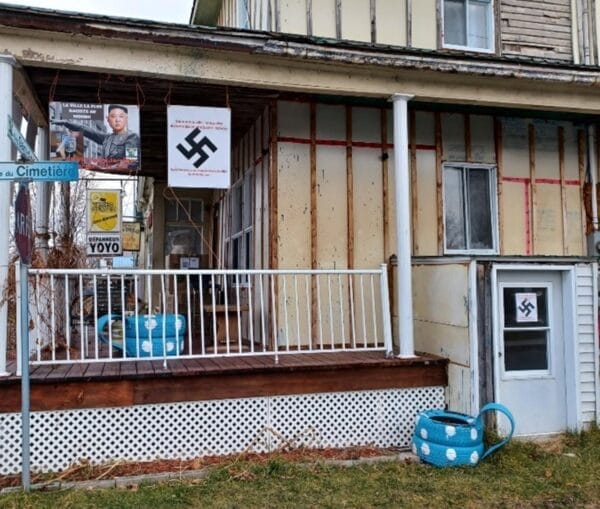The man who launched a campaign of antagonizing rhetoric against his small town’s administration by posting swastikas and calling it the most racist town in the world has been fined $7,000 for contempt of court, a Quebec judge ruled May 5.
Yahia Meddah, 53, was found guilty of two counts on March 14 by Quebec court judge Chantal Lamarche, in what may be the final salvo in his protracted battle with the town of Saint-Barnabé-Sud in Quebec’s Montérégie region, 80 km southeast of Montreal.
The accused had refused to remove defamatory posters and a website as ordered by a November ruling. In June 2024, Meddah put up posters with swastikas outside his home, comparing the town’s leadership to Adolf Hitler and Kim Jong-un, and setting up websites calling the town of about 1,000 residents the “most racist on the planet.” The Algerian national had been ordered to remove the defamatory signs but refused to do so, then removed and reposted them, as he did with various web pages he was ordered to remove.
The judge found that Meddah’s defiance in the face of court judgments undermined the credibility of the justice system and jeopardized public order. The town’s lawyers were seeking a larger fine and consideration of a prison sentence, while Meddah’s lawyer argued for a much smaller amount and community service. Lamarche found imprisonment was not justified, but ordered fines of $5,000 and $2,000 for his actions regarding the posters and website, respectively.
“In addition, the posters on the building in Saint-Barnabé-Sud are seen by a large number of people, citizens of the municipality or not, who drive along this main street in the municipality,” wrote Lamarche in her 11-page judgement.
“Not only are these posters prohibited by a court ruling, but in addition to being defamatory, they are highly emotive for many people because they display images of a Nazi symbol such as the swastika, associating the municipality with the Nazi regime, with Adolph Hitler, guilty of atrocities, or with another dictator. We must not underestimate the impact that such images can have on the population in general and on the Jewish population in particular.”
In other words, these infractions, she said, were not simply a violation of a municipal bylaw as Meddah’s lawyers argued.
The case stemmed from a 2022 conflict over a fire department and police inspection of his home, also ordered by the court, after the province’s hydro utility suspended Meddah’s service alleging that he was using fraudulent accounts, and authorities believed he was using illegal and unsafe means to power his property.
The affair cast a pall on the small town, beset by both material costs and litigious energy, as frequent court hearings and attention to the matter dragged on. Meddah also faces charges of harassment of the town’s director-general, Linda Normandeau, who told the court of the “devastating effect” of the site and signs on citizens and town employees, “who were shocked, outraged, and unsettled.”
Meddah came to Canada in 1998, days after escaping from a Florida psychiatric hospital where he had been detained for two years following his illegal entry into the United States and failed bid for refugee status. At the time, according to news reports, American authorities alleged that he had ties to Islamic terrorism in the Maghreb, which he refuted. No case was ever brought to trial, and Meddah had escaped to Canada before the U.S. government could take any other action.
His current status in Canada is unclear.
The court’s recognition of the impact of Nazi symbolism and language resonated with B’nai Brith Canada, which in January launched a petition calling on Ottawa to ban, with some exceptions for educational and artistic intents, public display of Nazi symbols and iconography, including the Nazi hooked cross (Hakenkreuz).
“Since the atrocities of World War II, the Nazi hooked cross has become universally synonymous with systematic violence, terror and hate,” reads the petition. “Its growing presence in our country poses a threat to every single Canadian citizen, undermining the core values of equality, diversity, and inclusion that define our nation. Eighteen countries have already taken action to ban these symbols. It is imperative that Canada follow suit.” More than 35,000 people have signed the petition, which will soon be delivered to the federal government, B’nai Brith Canada’s regional director for Quebec and Atlantic Canada Henry Topas told The CJN.
When Meddah’s signs were first judged defamatory and ordered removed, Topas applauded the town administration “for standing up for what is right. This decision underscores the need for legislation to combat the use of Nazi symbols, such as the Hakenkreuz, which are increasingly being used to harass people and spread hate.” These symbols are offensive not only to Jewish Canadians, he said, but to the many Canadians, including many Quebecers, who fought and died to bring down Hitler’s regime. “As Canadians, we must unite to reject the perverse use of the Nazi swastika and other Nazi imagery.”
“We hope Judge Lamarche’s decision will add weight to the petition” said Topas, who told The CJN that the judge should be praised for the clarity of her judgement, adding, “we wish that a more severe penalty would have been handed down to drive home the horror of continued use of Nazi iconography.”
Author

Joel has spent his entire adult life scribbling. For two decades, he freelanced for more than a dozen North American and European trade publications, writing on home decor, HR, agriculture, defense technologies and more. Having lived at 14 addresses in and around Greater Montreal, for 17 years he worked as reporter for a local community newspaper, covering the education, political and municipal beats in seven cities and boroughs. He loves to bike, swim, watch NBA and kvetch about politics.
View all posts








